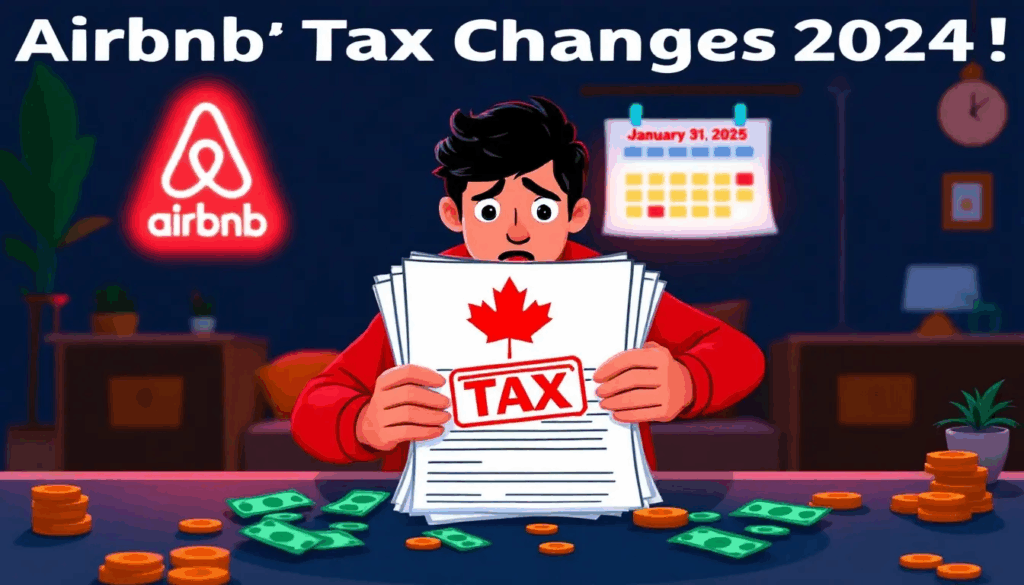Understanding Digital Platform Reporting, Income Tax, and Avoiding CRA Penalties
There are many changes coming to the short term rental marketplace. I started Short Term Rentals in 2000 and of course there weren’t these rules that stops business growth and enjoyment. I remember when I started hosting guests, it was so easy to do and so enjoyable. Now fast forward 2025, it’s anything but enjoyable. I, along with many hosts that I have spoken to, have found this business to be more of a chore than it’s enjoyable…..
Why is that you ask? It’s because of all the additional taxes, rules, guests who think they own your home and can do what they want and not go by the house rules. The government in all their wisdom think they know our business better than we do. When you get the government’s nose in a private business, there’s guarantee to be a disaster. Most of all the return on investment is becoming smaller and smaller, with all the expenses, taxes, upkeep, staffing and of course the most important you’re on 24 hours a day!! Sure it’s fun and exciting at the beginning and then boredom and impatience sets in!! Be sure to read the article below to find out about a new added taxes on our short term rentals.
Enjoy,
Maria Rekrut

If you’re a Canadian host renting out your property on platforms like Airbnb or Vrbo, new tax rules from Bill C-47, Budget Implementation Act, 2023, No. 1 could affect your income in 2025. Enacted on June 22, 2023, this legislation introduces digital platform reporting rules that increase transparency for gig economy workers, including short-term rental hosts. With the Canada Revenue Agency (CRA) now receiving detailed income data from platforms, compliance is more critical than ever.
This article breaks down what these changes mean for you, how to stay compliant, and strategies to optimize your tax obligations.
What Are the Digital Platform Reporting Rules?
Starting in 2024, with the first reports due January 31, 2025, digital platforms like Airbnb must report host information to the CRA, including:
- Personal Details: Name, address, and tax identification number.
- Income Data: Gross earnings from short-term rentals (typically less than 30 days).
- GST/HST Obligations: Platforms may collect and remit GST/HST for unregistered hosts, impacting those with taxable supplies over $30,000 annually.
These rules, part of Bill C-47, align with OECD guidelines to curb tax evasion in the gig economy. However, small-scale hosts earning less than €2,000 (approximately CAD $2,800) annually or with fewer than 2,000 transactions may be exempt from reporting, though platforms may still collect basic data.
Who Is Affected?
Not all Canadian hosts face the same impact:
- Active Short-Term Rental Hosts: If you earn significant income (above €2,000/year) on Airbnb, Vrbo, or similar platforms, your earnings will likely be reported to the CRA.
- Small-Scale Hosts: Those earning below the €2,000 threshold may be exempt, but you must still report rental income on your tax return.
- Non-Digital Hosts: If you rent privately (e.g., through classified ads), these rules don’t apply, but existing tax obligations remain.
- Non-Resident Hosts: Non-residents renting Canadian properties may face GST/HST collection by platforms, increasing compliance costs.
How Bill C-47 Affects Your Taxes
Income Tax
The CRA will cross-reference platform-reported income with your tax return, increasing audit risks for unreported earnings. Hosts must report rental income on Form T776 (Statement of Real Estate Rentals), even if below the reporting threshold. Deductible expenses (e.g., utilities, cleaning fees, or mortgage interest) can offset income, but accurate record-keeping is essential.
GST/HST Compliance
If your annual taxable supplies (including rental income) exceed $30,000, you must register for GST/HST and charge it on rentals. Platforms may collect GST/HST on behalf of unregistered hosts, but you’re responsible for remitting it if registered. Bill C-47’s rules ensure platforms report GST/HST data, so non-compliance could trigger penalties.
Penalties for Non-Compliance
Failing to report income or GST/HST can lead to:
- Penalties: Up to 50% of unreported taxes owed.
- Interest: On overdue amounts.
- Extended Reassessment Periods: The CRA can reassess beyond the standard three-year period for non-compliance with mandatory disclosure rules.
Strategies to Stay Compliant
- Track Income and Expenses: Use tools like QuickBooks or spreadsheets to log all rental income and deductible expenses (e.g., repairs, advertising).
- Understand GST/HST Obligations: Check if your rental income exceeds $30,000 annually. Consult a tax professional to determine registration needs.
- File Accurately: Report all platform income on your tax return, even if exempt from platform reporting. Use CRA’s My Account to monitor reported data.
- Leverage Deductions: Claim expenses like property taxes, insurance, or home office costs to reduce taxable income.
- Prepare for Audits: Keep records for at least six years, as CRA’s access to platform data heightens audit scrutiny.
Other Bill C-47 Changes Relevant to Hosts
- Residential Property Flipping Rule: If you sell a rental property within one year of acquisition, profits are taxed as business income (100% taxable) rather than capital gains (50% taxable). This may affect hosts flipping properties frequently.
- Electronic Filing: For 2024 and beyond, GST/HST returns and payments over $10,000 must be filed electronically, with penalties for non-compliance ($100 per violation).
What’s Next for Canadian Hosts?
As platforms begin reporting in 2025, the CRA will intensify efforts to ensure compliance. Small-scale hosts may face minimal changes if exempt, but all hosts should:
- Review Platform Communications: Airbnb and others will notify hosts about reported data.
- Consult a Tax Advisor: A professional can clarify your obligations, especially for GST/HST or complex rental setups.
- Stay Informed: Check www.canada.ca for CRA updates on digital platform reporting.
Conclusion
Bill C-47’s digital platform reporting rules mark a shift toward greater tax transparency for Canadian hosts. While compliance may feel daunting, proactive steps—tracking income, claiming deductions, and understanding GST/HST—can minimize stress and penalties. Whether you’re a full-time Airbnb host or renting out a spare room, staying informed and prepared will keep you ahead in 2025.
Disclaimer: This article is for informational purposes only. Consult a tax professional for personalized advice.
Sources: Canada Revenue Agency, Parliament of Canada, TurboTax Canada.
#BillC47, #AirbnbTaxes2025, #CanadianAirbnbHosts, #CRACompliance, #DigitalPlatformReporting, #GSTHST, #ShortTermRentalTaxes, #GigEconomyCanada, #AirbnbHostTips, #CanadianTaxChanges,

 Follow
Follow









